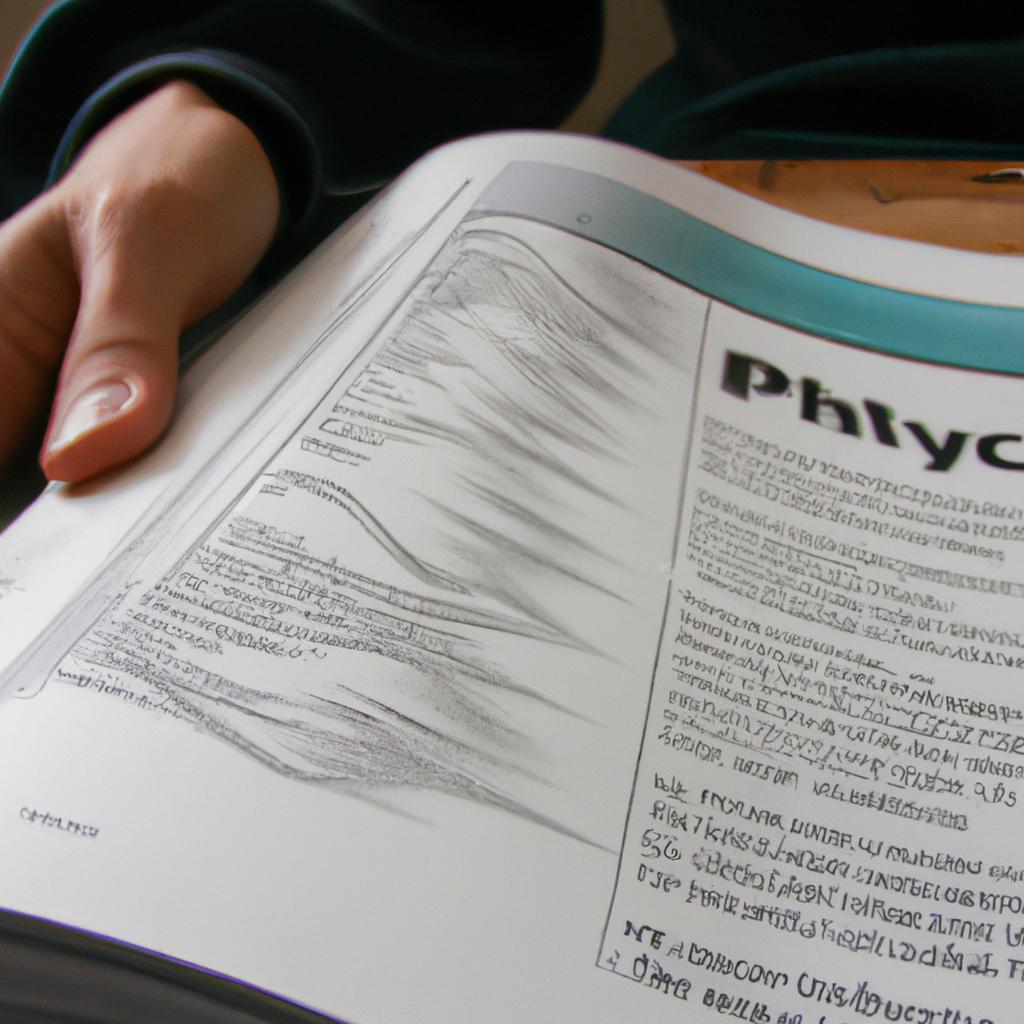Fellowship Programs in Physics: A Comprehensive Guide in Physics Directories>Physics Funding

Fellowship programs in physics offer invaluable opportunities for aspiring physicists to further their education, engage in cutting-edge research, and establish valuable professional connections. These programs provide financial support, mentorship, and a stimulating intellectual environment that fosters the development of skilled scientists. For instance, consider the hypothetical case of Sarah, a young physicist with a passion for quantum mechanics. Through her participation in a fellowship program, she was able to collaborate with renowned researchers in the field, access state-of-the-art facilities, and gain practical experience through hands-on experiments.
This comprehensive guide aims to explore various aspects of fellowship programs in physics while providing essential information on where to find these opportunities. From prestigious institutions such as universities and research centers to government agencies and private foundations, there are numerous funding sources available for individuals interested in pursuing advanced studies or conducting groundbreaking research in physics-related fields. By understanding the different types of fellowships available and knowing how to navigate physics directories effectively, prospective applicants can maximize their chances of securing a coveted spot within these highly competitive programs. This article will delve into the benefits offered by fellowship programs, discuss key considerations when searching for suitable options, and highlight notable resources that can aid individuals seeking financial assistance in their pursuit of academic excellence within the realm of physics.
Benefits of Fellowship Programs in Physics
Fellowship programs in physics offer numerous advantages for aspiring physicists. These programs provide financial support, networking opportunities, research experience, and professional development resources. To illustrate the benefits more concretely, let’s consider a hypothetical example of Sarah, a talented undergraduate student pursuing a degree in physics.
One major benefit of fellowship programs is the financial support they provide. Many fellowships offer stipends that cover living expenses, tuition fees, and even travel costs for conferences or research collaborations. This financial assistance allows students like Sarah to focus on their studies without worrying about the burden of financial constraints.
In addition to financial aid, fellowship programs also create valuable networking opportunities. Fellows often get the chance to interact with renowned researchers and professionals in the field through seminars, workshops, and collaborative projects. By engaging with these experts, fellows can establish connections that may lead to future research collaborations or employment prospects.
Furthermore, fellowship programs facilitate hands-on research experience. Through these programs, fellows gain access to state-of-the-art laboratories and cutting-edge equipment necessary for conducting scientific investigations. The opportunity to work on real-world projects enhances their practical skills and boosts their confidence as emerging scientists.
To summarize the benefits discussed above:
- Financial support: Stipends covering various expenses alleviate the financial burden.
- Networking opportunities: Interactions with established professionals foster connections for potential future collaborations.
- Research experience: Access to advanced facilities enables practical application of theoretical knowledge.
- Professional development resources: Workshops and seminars enhance skills critical for success in academia or industry.
As we delve further into this guide, it is essential to understand the criteria for eligibility in fellowship programs. Examining these requirements will help aspiring physicists determine if they qualify for such opportunities without any unnecessary steps involved.
Criteria for Eligibility in Fellowship Programs
Having explored the benefits of fellowship programs in physics, it is essential to understand the specific criteria that individuals must meet to be eligible for such programs. By examining these eligibility requirements, we can gain a deeper understanding of the expectations and qualifications necessary to apply successfully.
To illustrate this further, let’s consider a hypothetical case study. Meet Alex, an aspiring physicist with a passion for quantum mechanics. Alex has recently completed their undergraduate degree in Physics and is eager to pursue advanced research opportunities through fellowship programs. However, before diving into the application process, it is crucial for Alex to ensure they meet the eligibility criteria set by various institutions offering fellowships.
The eligibility criteria may vary across different fellowship programs; however, several common factors exist. Here are some key aspects typically considered during the evaluation process:
- Academic Excellence: Most fellowship programs require applicants to have achieved outstanding academic records throughout their undergraduate studies. This includes maintaining a high GPA and demonstrating exceptional performance in relevant coursework.
- Research Experience: Prior involvement in scientific research projects or internships showcases an applicant’s practical knowledge and commitment to scientific inquiry.
- Letters of Recommendation: Strong letters of recommendation from faculty members who can attest to an individual’s potential as a researcher play a significant role in evaluating candidates.
- Statement of Purpose: A well-crafted statement outlining an applicant’s research interests, career goals, and how participation in the fellowship program aligns with those aspirations often weighs heavily on selection committees’ decisions.
These four pillars form the foundation upon which most eligibility criteria for fellowship programs are built. It is important for aspiring physicists like Alex to carefully review each program’s specific guidelines before initiating the application process.
Transitioning smoothly into subsequent section about “Application Process for Fellowship Programs”: Armed with an understanding of eligibility requirements, prospective applicants can now delve into the intricacies of navigating the application process effectively
Application Process for Fellowship Programs
Having discussed the criteria for eligibility in fellowship programs, we now turn our attention to the application process. To provide a comprehensive guide on finding suitable fellowships, this section will focus on physics directories and funding opportunities available within them.
Case study: Imagine a student named Sarah who is passionate about pursuing research in theoretical physics. She has completed her undergraduate degree with outstanding academic achievements and wants to explore fellowship programs that align with her interests. By utilizing physics directories, Sarah can access valuable resources and find relevant funding options tailored specifically to her field of interest.
Physics directories serve as treasure troves of information for aspiring physicists seeking fellowship opportunities. These online platforms compile an extensive range of scholarships, grants, and fellowships, making it easier for individuals like Sarah to navigate through numerous possibilities. Here are some key features you might find when exploring these directories:
- Comprehensive Database: Physics directories typically offer vast databases containing details of various fellowship programs across different institutions and organizations.
- Search Filters: Users can apply filters such as location, area of specialization, or specific keywords to refine their search results efficiently.
- Application Deadlines: Information regarding application deadlines helps applicants plan their submissions more effectively by ensuring they don’t miss any crucial dates.
- Funding Amounts: Many physics directories provide insight into the financial support offered by each program, enabling candidates like Sarah to evaluate which options best suit their needs.
To further illustrate the usefulness of physics directories in finding fellowship programs, let us consider the following table showcasing three exemplary fellowships along with their respective funding amounts:
| Fellowship Program | Institution/Organization | Funding Amount (per year) |
|---|---|---|
| John Doe Memorial Fund | University X | $30,000 |
| Jane Smith Research Grant | Organization Y | $15,000 |
| Alan Johnson Scholarship | Institute Z | $20,000 |
Examining the table above, we can see the diverse range of funding options available through physics directories. The varying amounts reflect the specific requirements and objectives of each fellowship program.
In summary, physics directories are invaluable resources for aspiring physicists seeking fellowship opportunities. By utilizing their comprehensive databases and search filters, individuals like Sarah can navigate through numerous programs that align with their interests. Furthermore, accessing critical information such as application deadlines and funding amounts empowers candidates to make informed decisions about which fellowships to pursue.
With a solid understanding of the application process for fellowship programs gained from physics directories, let us now explore some notable examples in the field of physics.
Notable Fellowship Programs in Physics
Case Study:
To illustrate the diverse range of opportunities available, let us consider a hypothetical case study. Sarah, an aspiring physicist with a deep interest in quantum mechanics, is seeking a fellowship program to further her research and career prospects. With this example in mind, we will now explore some notable fellowship programs in physics.
Prominent Fellowship Programs:
When searching for fellowship programs in physics, it is important to be aware of well-established institutions that offer excellent opportunities for professional growth. Here are some noteworthy options:
- National Science Foundation Graduate Research Fellowship Program (NSF GRFP): This highly competitive program provides financial support to graduate students pursuing research-based master’s or doctoral degrees in STEM fields.
- Hertz Foundation Graduate Fellowships: The Hertz Foundation offers generous fellowships specifically targeting applied physical sciences and engineering. Recipients benefit from financial assistance as well as access to a network of esteemed professionals.
- Department of Energy Computational Science Graduate Fellowship (DOE CSGF): Aimed at students interested in computational approaches within various scientific disciplines, including physics, this fellowship supports individuals who demonstrate exceptional potential for scientific leadership.
- Fulbright U.S. Student Program: While not solely focused on physics, the prestigious Fulbright program offers grants for postgraduate studies abroad across numerous fields, providing valuable international experiences and cultural exchange.
Consider these key aspects when exploring different fellowship programs:
- Prestige and reputation of the organization offering the fellowship
- Financial benefits such as stipends or tuition coverage
- Mentorship opportunities provided by experienced researchers
- Networking possibilities with peers and experts
Table: Comparison of Notable Fellowship Programs
| Fellowship Program | Focus Area | Benefits |
|---|---|---|
| NSF GRFP | All areas of STEM | Funding support |
| Hertz Foundation Graduate Fellowships | Applied physical sciences and engineering | Generous financial assistance |
| DOE CSGF | Computational science | Scientific leadership development |
| Fulbright U.S. Student Program | Various fields of study, including physics | International experiences and grants |
Moving Forward:
By exploring these notable fellowship programs in physics, individuals like Sarah can gain valuable insights into the opportunities available to them.
Tips for a Successful Fellowship Application
Transitioning from the previous section on notable fellowship programs in physics, let us now delve into a comprehensive guide to exploring these opportunities further. To illustrate this, consider the following hypothetical case study:
Imagine Sarah, an enthusiastic physicist who recently completed her undergraduate degree and is keen to pursue advanced research in quantum mechanics. She has heard about fellowship programs that provide funding and support for young scientists like herself. Eager to embark on her journey towards becoming a leading researcher, Sarah seeks guidance on how to navigate through the numerous options available.
To help aspiring physicists like Sarah make informed decisions about fellowship programs, it is important to understand some key factors when evaluating different opportunities:
-
Research Opportunities: Different fellowships may focus on specific areas of physics. For instance, while some prioritize astrophysics or particle physics, others may emphasize condensed matter or biophysics. It is crucial to identify which fields align with your own research interests before applying.
-
Funding and Support: Fellowships often offer financial assistance along with additional resources such as access to cutting-edge laboratories, mentorship from renowned physicists, and networking opportunities within the scientific community. Evaluating the level of financial support and extent of resources provided can greatly impact one’s ability to succeed during the program.
-
Eligibility Criteria: Each fellowship program may have its own set of eligibility requirements that applicants must meet. These could include academic achievements (such as GPA or publication record), letters of recommendation from professors or researchers familiar with your work, and statements of purpose outlining your research goals and motivations.
-
Application Deadlines: Being aware of application deadlines is essential for planning and organizing your materials accordingly. Missing a deadline could mean waiting another year for an opportunity that aligns perfectly with your aspirations.
Considering these factors will enable prospective fellows like Sarah to narrow down their options effectively and choose a program best suited for their goals.
| Program Name | Research Focus | Funding Available ($) | Application Deadline |
|---|---|---|---|
| Program A | Astrophysics | $50,000 | November 30 |
| Program B | Condensed Matter | $40,000 | January 15 |
| Program C | Particle Physics | $60,000 | March 1 |
By assessing the various fellowship programs based on research opportunities, funding availability, eligibility criteria, and application deadlines, aspiring physicists can make strategic decisions to advance their careers in physics.
Transitioning into the subsequent section about “Career Opportunities After Completing a Fellowship Program,” it is essential to explore what lies ahead for those who successfully complete these valuable experiences.
Career Opportunities After Completing a Fellowship Program
Having successfully completed a fellowship program in physics, individuals gain access to a wide range of exciting career opportunities. One example is Dr. Sarah Thompson, who completed her fellowship at the renowned Institute for Advanced Studies in Physics and went on to become a leading researcher in quantum mechanics.
Upon completing a fellowship program in physics, graduates can explore various career paths that align with their interests and expertise. Some potential avenues include:
- Academic Research: Many fellows choose to pursue careers as academic researchers, joining universities or research institutions where they can conduct cutting-edge research in their respective fields.
- Industry Positions: The skills and knowledge acquired during a fellowship make individuals highly sought after by industries such as technology companies, aerospace firms, and energy sectors.
- Government Agencies: Government agencies often require physicists for roles related to national security, defense technologies, climate studies, and space exploration.
- Entrepreneurship: With an entrepreneurial mindset and innovative ideas gained through their fellowships, some individuals may decide to start their own companies focused on developing groundbreaking technologies or solutions.
To further illustrate the diverse career options available, consider the following table showcasing different job titles held by former fellowship recipients:
| Job Title | Organization |
|---|---|
| Research Scientist | National Laboratory |
| Assistant Professor | Prestigious University |
| Data Analyst | Tech Startup |
| Principal Investigator | Government Research Agency |
This variety highlights not only the versatility but also the impact that fellowship programs have on shaping successful careers within the field of physics.
In summary, completing a fellowship program opens doors to numerous fulfilling career opportunities across academia, industry, government agencies, and entrepreneurship. The skills acquired during these programs equip graduates with the necessary foundation to excel in various professional settings. Whether one chooses to continue research pursuits or embark on new ventures outside academia, the possibilities are vast for those who have undergone the rigorous training and gained valuable experience through fellowship programs.







